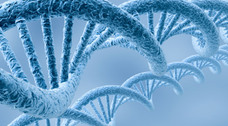From genetics to epigenetics

Genes have been located, analyzed, broken down, decrypted, and sequenced. From humans to rats, goats to buffalo, fruit flies to even rice and wheat, genes have been scrutinized under the microscope in worldwide laboratories, where scientists have been slowly but surely unravelling the mystery of these DNA fragments that knit living organisms together. However, the essence of these fragments may go beyond genetics; their essence is perhaps found in the realm of what is known as epigenetics.
Douglas Institute researcher Michael Meaney, PhD, along with his colleague Gustavo Turecki, MD, PhD, have made spectacular findings in epigenetics over the past years. Not only does our environment influence our mental and physical health, it can also change the functioning of the genes we inherit at birth. Epigenetics therefore refers to how genes are controlled by a series of switches: the food we swallow, the air we breathe, or even the affection we receive from our parents have the power to turn gene activity "on" or "off."
The idea that our diets make us more or less vulnerable to certain cancers is nothing new. But we now know that by activating epigenetic switches, food can alter how genes behave. These modifications can even be passed down from generation to generation. For example, constant overeating can leave a lasting mark on the health of our children. A famous Swedish study even showed that a period of famine can have repercussions not only on the longevity of those who experience it but also on the life spans of these individuals' grandchildren!
Simple hugs?
Simple hugs may also have the power to influence genetic mechanics. Baby rats that are licked often by their mothers—with licking in rats fulfilling the same function as cuddling in humans—are calmer than rats that are not licked enough. Michael Meaney and his team delved further into this idea by tracking the imprint left by maternal care in the brain of young rats. They were able to do this because the action of licking influences the activity of a gene (called NRC31) that protects rats against stress; when activated, this gene produces a protein that helps decrease the concentration of stress hormones in the body. A specific part of this gene must also be activated via an epigenetic switch. An analysis of the brains of rats that received insufficient licking showed that the NRC31 switch was defective in the hippocampal neurons of these rats. The result: even in the absence of stressors, these rats lived in a state of constant stress.
Mini-Psych School videos
| Childhood abuse affects the brain (2010) | |
Watch other Mini-Psych School lectures.
Different species, similar mechanisms
Both rats and human beings share a similar stress mechanism. Michael Meaney, with the help of Project Coordinator Hélène Gaudreau and her research team, initiated an ambitious study called the MAVAN (Maternal Adversity Vulnerability and Neurodevelopment) project, which involves a six-year developmental assessment of children, some of whom have a mother who suffers from severe depression. As these women often have difficulty creating emotional ties with their children, it is likely that they cuddle their babies less often than non-depressed mothers in the control group. The research team will measure the levels of stress hormones in these children while looking at what goes on in their brain with the help of brain imaging techniques.
To more effectively measure the effect of epigenetics on the human brain, Douglas Institute researchers completed another study on human brains post-mortem. They targeted the NR3C1 gene (the same gene analyzed in rats) to show that the quality of familial interactions indeed changes this gene's activity. They arrived at this conclusion after studying 36 brains: 12 from victims of suicide who had been subjected to childhood abuse; 12 from victims of suicide who had not been subjected to particular abuse; along with 12 control brains. The answer was practically written in their neurons: mistreatment led to epigenetic modifications that, in turn, altered the functioning of the NR3C1 gene. Just as in rats, the glands that secrete stress hormones were in a state of constant alert in these mistreated individuals, which made them particularly susceptible to anxiety, depression and possibly suicide.
The good news is that contrary to genetic mutations, which are irreversible, epigenetic switches may be changed. For example, medications might be able to repair "defective" switches. A simple change of environment could also lead to a promising outcome, the case of the rats being a clear example: when given to an affectionate adoptive mother, the baby rat of an unaffectionate mother will develop normally. This goes to show that the destinies of both small rats and small humans are never set in their DNA.



